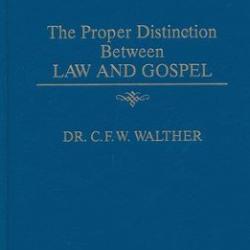
+++
First question: “Can unbelievers seek God?”
Udo Middlemann, in his book The Innocence of God, says that many Christians give this impression to unbelievers: “their search [for God] is hopeless, they are unable even to seek; it is all a matter of predestination from God alone.” (63).
Is Middlemann correct?
After all, the Lord’s Apostles do say:
- For the message of the cross is foolishness to those who are perishing (I Cor. 1:18).
- The person without the Spirit does not accept the things that come from the Spirit of God but considers them foolishness… (I Cor. 2:14).
- That which is born of the flesh is flesh; and that which is born of the Spirit is spirit (John 3:6).
- All of us [Christians] also lived among [the unbelievers] at one time, gratifying the cravings of our flesh and following its desires and thoughts. Like the rest, we were by nature deserving of wrath (Eph. 2:3).
- No one understands; no one seeks for God (Rom. 3:11).
How can one change one’s very nature or essence? How can one even seek to changes one’s very nature or essence? Evidently, there is only so much those captive to the devil’s will (see 2 Tim. 2: 24-26) can do here!

That said, given that elsewhere the Apostle Paul encourages non-Christians to seek God (Acts 17:27), the real point is this: unbelievers do seek wrongly, but even wrong seeking can nevertheless be beneficial when it leads to hearing God’s Word!
Second question: “What is the best reason for them to go to church?”
To start to address this second question, let’s begin by asking the following:
“Is attending a worship service, for example, where the Scriptures are read and preached, better than not attending at all?”
The answer to this question is definitely yes! Strive to enter God’s Kingdom by the narrow gate – with all your wrong reasons in tow!
So, who, for example, attends a Christian worship service for the wrong reasons? Well, a number of persons do.
Remember from our first question above that the Lord’s apostles give the impression that unbelievers can’t even begin to read the Word of God or attend Christian worship for the right reasons – even if they want to do these things![i]

So what in the world is happening here? Well, all of the following—which is by no means an extensive list—might be one’s overriding reasons for reading the Bible or attending worship, and none of them should ever be the main reason:
- To please a family member
- Because you live in “Christendom,” and that is what the baptized citizen does (oops – wrong century!)
- To be seen as a person who upholds traditional values (wrong century again?)
- To get connected with the Big Sugar Daddy in the clouds
- To get on the Big Man’s good side.
- Assuming “knowledge is power,” to become a more well-informed and intelligent person
- To make connections with those in a community
- To join in acts of social justice with others from a community
- To learn more about the topic ; to get information (for whatever reason)
- Simple curiosity!
- To confirm one’s biases against the faith and its followers
- That one may boast of one’s extensive knowledge of the Scriptures ; to satisfy one’s own pride
- To be a better person than my neighbor
- To find support for one’s sectarian or heretical opinions
- Because one likes to listen to the preacher, like Herod did John the Baptist, or St. Augustine did St. Ambrose
- To find meaning, direction, and growth in life
- The idea that one ought to do something like this in order to be a good person
- Guilt, underlying fear of judgment and punishment
- Terror of the possibility of the God who just might judge the world, as evidenced from His raising Jesus from the dead (see Acts 17:30-31)

A couple comments.
First of all, some of those reasons given above are not just about unbelievers but common to Christians as well! The fact of the matter is that while we are new creations we will struggle our whole life long with what the Bible calls our “old Adam” or nature (see Romans 7). This church thing is often not easy for Christians either!
Second, some of you may be wondering what is particularly wrong with those last four options?
It is because they have nothing to do with Christian faith per se.

Christians attend worship services because they have been incorporated into God’s people by the Gospel of Jesus Christ. “God has brought you out of darkness into his marvelous light!” (I Pet. 2:9) This in turn has caused in them a desire to trust, love, and revere and honor the Triune God. Through the life, death, and resurrection of Jesus Christ which gives them forgiveness, life, and salvation, they are those who now give God their primary attention.
They, along with their brethren, come to sit at His feet and be blessed.[ii]
OK – but let’s get back to the person who comes for all the wrong reasons. If they come for those last three reasons in particular, might that be better than coming for the other reasons?
Yes.
In fact, if a person is an unbeliever, there is only one thing they can do in regards to God internally that is “salutary”… beneficial (its only “good” — note the quotes — in a fallen world)…
Be terrified.

Why?
Because then such a person might find himself in His Presence and really care to hear what He has to say to him.
And how can we hear what God has to say to us?
In these last days, by listening to His Son (Heb. 1:2), whom He not only raised from the dead to demand our attention, but that we might have new life.

You’ll hear about Him in a faithful church — one that takes the Bible seriously. And, one hopes, where there is a great concern that His Word and Sacraments are administered in their truth and purity.
Go – and listen attentively. Seek the Lord while He may be found![iii]

If this doesn’t describe your current situation, I hope this link might prove helpful to you.
See you there!

+++
And, by the way, if you are a Christian reading this, I should add one more key reason people darken the door of a church: because you, their friend, their neighbor, their co-worker, invite them!
FIN
Notes
[i] Francis Pieper: “Calovius before others gives luminous and clear-cut expression to the truth that before a person’s conversion is accomplished for the first time, no spiritual motions can be ascribed to him. He says: “Though unconverted persons at times gladly hear the messengers of the Word, this is because of the outward talents of the latter, or from some other carnal desire (ob aliam quamvis cupiditatem carnalem), as in the case of Herod. [[Mark 6, 7 >> Mk 6.7]], and is not due to an inclination for the Word of God (ob affectum erga Dei verbam), since such inclination is a product of faith (e fide redandat), which originates only from hearing the Word, [[Rom. 10, 17 >> Rom 10.17]]. Before conversion there is no such spiritual desire (desiderium spirituale) nor any such inclination towards the divine Word, because the Word is foolishness to natural man, and meets with his resistance, [[1 Cor. 2, 14 >> 1 Cor 2.14]]; [[Rom. 8, 7 >> Rom 8.7]].”[i]) And again: “If in the unconverted man pious motions, holy thoughts, beginnings of faith, a struggle of the spirit against the flesh are imagined (finguntur), this involves a self-contradiction; for where such motions occur, man is awakened from death and already lives through spiritual life. …” p. 112, Conversion and Election, 1913.
[ii] Pastor Todd Wilken, in his article “Why Do You Go to Church?” has said that we go to church to get the forgiveness of sins.
I think his article can basically give us this important message: “This is where you can positively, definitively, find forgiveness of sins and peace with God! This is where He has promised to be, to chase out all your uncertainty!” Yes indeed! It is there, after all, that you can find the authoritative pronouncement of the same by ministers trained and authorized to carry out His commission and administer His “means of grace”.
On the other hand, I also think I go to church precisely because I’ve been taught that God’s mercy and compassion precedes my ongoing repentance. I’ve been taught—and I believe the Bible confirms—that God forgives those sins I’ve committed even without my awareness. Therefore, the forgiveness that happens in worship is really the very public (and authoritative!) “tip of the iceberg,” if you will. So I would also say, in general, we go to church to get forgiven because we are people who have been formed by Christ’s forgiveness by virtue of continually hearing His Word, the most important public example of this being the public worship service.
By the way, these worship services might be more or less “public” (the early Christians worshipped in the homes of wealthier believers). Nevertheless, Christians are told to continually gather with one another and do, for “no man is an island” – much less a man on an island with just His Bible!—and we are no doubt formed by others in Christian community. We also offer the “right hand of fellowship” to other believers. The more the merrier, even as at some point we might think either that we are getting to big or that it would not be a bad idea to split up and have more “cells” where others can also find and worship Jesus.
[iii] “Lucas Osiander, commenting on [[Is. 55, 6 >> Is 55.6]], says: Tum Dominus prope est et inveniri potest, cum per evangelii praedicationem nobis salutem offert. Cum autem verbum suum aufert, ut non amplius recte agnoscatur, tunc nec inveniri neque recte invocari potest. Quare grata mente occasionem, qua Dominus ad nos clementer accedit, arripiamus. That is to say: “The Lord is near and can be found when through the preaching of the Gospel He offers salvation to us. But when He takes away His Word, so that it no longer is correctly understood, He can be neither found nor properly worshiped. Let us, then, gratefully seize the opportunity by means of which the Lord in His grace approaches us.” This manner of speaking has found its way into our Confession, where we read: “Such calling through the preaching of the Word we ought not to regard as a delusion, but know that God thereby reveals His will, that He would, by means of the Word, work upon those whom He thus calls, that they might be enlightened, converted, and saved.”[iii]) The expressions, “possibility of conversion,” “opportunity” of conversion, “possibility of being converted,” should, then, be retained in this sense, viz., that the saving grace of God comprises all men, that the Holy Spirit operates in all hearers unto conversion, and that the cause of non-conversion is to be sought solely in man’s resistance.” (Pieper, 119, 120).















